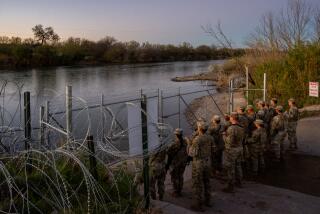Attorneys Say Surrender Worked Out With Koresh : Waco: Two testify fatal fire came days after negotiating a plan to end standoff. Officials deny it was breakthrough.
Two attorneys told a congressional hearing Tuesday that they had negotiated a detailed surrender plan with the FBI and cult leader David Koresh that could have ended the 1993 siege at the Branch Davidian compound near Waco, Tex., and averted the government assault that left about 80 sect members and children dead.
The agreement, struck on April 14, 1993, called for Branch Davidians to leave their complex one by one through metal detectors within two weeks once Koresh had completed a religious manuscript he had been writing, the lawyers said. On April 19, five days after the agreement, the FBI, citing “a total impasse” in negotiations with Koresh, proceeded with plans to launch a tear gas assault.
“We had a deal. We were going to do it,” said Jack Zimmerman, a Houston lawyer who represented Koresh’s top aide and was permitted to enter the compound during the 51-day siege while Koresh negotiated with the FBI. “What would have been lost if [the government] had waited 10 more days?”
But Justice Department officials in interviews Tuesday insisted that Koresh’s commitment, spelled out in a handwritten letter, represented no real breakthrough and was nothing more than another delaying tactic. They stressed that Koresh had broken at least three previous promises to turn himself in.
Byron A. Sage, the FBI special agent in charge of the negotiations, said that Zimmerman and attorney Dick DeGuerin had been “duped” by Koresh. “I think they were just another instrument used by David Koresh in a pattern of deception,” Sage said.
The fifth day of House hearings on the events in Texas focused on the Justice Department and the FBI’s final assault on the Davidian compound. During the rest of the week, the special committee is scheduled to examine the decision to inject massive amounts of tear gas into the Mt. Carmel Center complex and questions about the fatal fire that consumed it.
Also Tuesday, a top investigator of the Texas Rangers criticized the FBI for using tanks to clear vehicles in front of the compound before the final assault. He said that the actions destroyed potentially critical evidence, such as the path of bullet holes shot into the vehicles.
The Rangers had asked the FBI to try to preserve the evidence because it was crucial to the murder investigation into the deaths of four ATF agents during a botched Feb. 28 raid.
Later, Texas Ranger Capt. David Byrnes said, his agency determined that two ATF supervisors, Special Agents Charles Sarabyn and Phil Chojnacki, lied to investigators about their roles in the botched initial raid, which also left six sect members dead. He said that the Rangers have referred their findings for possible criminal prosecution to the U.S. attorney’s office and that the case is now in the hands of Justice Department officials in Washington.
Justice officials said they were upset that Tuesday’s hearings gave two defense attorneys a high-profile platform from which to level nearly six hours of criticism at the government without permitting federal agents to testify as scheduled. The agents are expected to appear before the panel today.
Zimmerman and DeGuerin recounted how they were the only outsiders throughout the siege to meet with Koresh and Branch Davidian members and their children. The attorneys said that they saw bullet holes in the front door and the ceiling of Koresh’s bedroom that they believe support suspicions that ATF agents fired the first shots and later fired from helicopters during the Feb. 28 raid.
But the Treasury Department’s independent review of the episode and earlier testimony from ATF personnel failed to corroborate the attorneys’ claims. “Those helicopters did not fire at that compound,” said Lewis C. Merletti, deputy director of the Treasury review team, in an interview Tuesday. “It is just not the case.”
The committee heard pleas from DeGuerin and Zimmerman to find out what became of crucial evidence, including a bullet-riddled metal front door that disappeared after the fire and an ATF videotape of the initial raid. Government officials said the door was accidentally destroyed and that the ATF’s videocassette recorder was never activated.
DeGuerin and Zimmerman are respected criminal defense attorneys in the Houston legal community. Even though Democrats have been harshly critical of the hearings and many of the witnesses called by the Republican majority, the two lawyers won praise from Rep. Sheila Jackson Lee (D-Tex.), a member of the joint committee.
Both lawyers expressed deep frustration at their inability to secure the safe release of the Branch Davidian children. Nineteen children were killed in the fire.
“I thought we had some time,” DeGuerin said. “Mr. Zimmerman and I met most of the people in there. I met the children. I wanted to save their lives. . . . I feel that I failed.”
Zimmerman, a retired military judge, said: “I was hopeful. . . . I felt they’d be out in another 10 days. I had a sense of failure unlike any I’ve ever had before.”
Both witnesses said that the government made a terrible mistake in deciding to end the standoff by using tear gas, particularly when Koresh had indicated a timetable for his surrender only five days earlier.
DeGuerin was initially contacted by Koresh’s mother, Bonnie Haldeman, who asked him to represent her son. After traveling to Waco with Haldeman and being told by the FBI that he could not see Koresh, DeGuerin was contacted by federal authorities on March 28, a month after the initial raid. The next day, he met Koresh inside the Branch Davidian compound in the first of several visits. In all, DeGuerin said, he spent about 32 hours conversing with Koresh face to face and on the telephone.
On April 1, both DeGuerin and Zimmerman, who had been hired to represent Koresh’s top assistant, Steve Schneider, spent the entire day at Mt. Carmel inspecting the compound and interviewing members of the cult. They returned to the compound on April 4 for their last visit.
At one point, DeGuerin said, he was so frustrated with Koresh’s refusal to surrender that he threatened to resign as his attorney. But on April 14, the attorneys received what they described as “a major breakthrough” in the stalled negotiations. Koresh had agreed to surrender after completing his manuscript interpreting the biblical Seven Seals. He put his “promise in writing,” DeGuerin said.
DeGuerin said he met that afternoon in the parking lot of the FBI command post near Waco with Special Agents Bob Ricks and Jeffrey Jamar. The attorney said that he apologized to the agents because Koresh would not surrender immediately but believed that the cult leader was sincere about giving himself up when the manuscript was finished.
“Bob Ricks expressed some impatience, but Jamar shushed him and said: ‘We have all the time it takes,’ ” DeGuerin recalled. In an interview Tuesday, FBI supervisor Sage confirmed that Jamar gave DeGuerin such an assurance.
“It wasn’t a hard-and-fast deal,” DeGuerin said. “But we had arrangements for how it was going to happen.” This included allowing Koresh to come out first, accompanied by DeGuerin, to show Davidians that they would not be harmed. Davidians were to be fitted with plastic wrist restraints, mothers were to be permitted to accompany their children, and a federal magistrate was to be on site for processing. Schneider and Zimmerman were to be the last to leave the compound. Texas Rangers then were to secure the building.
Koresh also had agreed to submit his manuscript to two religious experts who had been consulted by DeGuerin. One of the experts, James D. Tabor, a University of North Carolina professor of religious studies, testified Tuesday that the exit plan was “workable” and the “first real breakthrough during the siege.”
But government officials were not so optimistic.
On April 15, the day after the agreement, Justice Department officials were pressuring Atty. Gen. Janet Reno to approve the tear gas strategy. They said that further negotiations with Koresh would be “fruitless” and that they had reached “a total impasse,” according to the Justice Department’s investigative report.
“When the FBI satisfied [Reno] that nothing else could end the standoff, she asked why it was important to act right away,” the report said. “[Sage] believed there was nothing more he or the negotiators could do to persuade Koresh to release anyone else or to come out himself. In addition . . . , law enforcement personnel at the scene were getting tired, and their tempers were fraying.”
While FBI officials “genuinely hoped” that the April 14 agreement was a new development, they did not believe Koresh was coming out and were planning the tear gas operation with the intention of rescuing the children inside, Sage said Tuesday.
“It was determined this was yet another delay tactic,” Sage said. “We felt this was David Koresh attempting to con his way into a little more time.”
More to Read
Start your day right
Sign up for Essential California for news, features and recommendations from the L.A. Times and beyond in your inbox six days a week.
You may occasionally receive promotional content from the Los Angeles Times.







